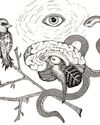
We are all concerned, to a greater or lesser degree, with ethical issues. Whether it be concerns over crime and punishment, humanitarian aid, ecological destruction, or simply the fact that your friend has broken a promise, ethical considerations seem to creep into almost all areas of life. But what is it that makes humans prone to thinking in terms of right and wrong or good and bad? Why are we psychologically predisposed to make judgements of the moral variety, and what does it actually mean to make a moral judgement? These are what philosophers might call ‘secondorder’ moral questions. They are among the chief concerns of the philosophical sub-field known as ‘metaethics’.
The Lay of the Land
Metaethics as a distinct discipline is little over a century old. It is generally considered to have begun with the book Principia Ethica written by G.E. Moore in 1903. In it Moore stressed the difference between thinking about which things are good (ethics), and thinking about what ‘good’ means (metaethics). Since then, many moral judgements have been metaethically sliced, diced and analysed. Indeed, metaethics has been a battlefield. Metaphysical muddles, semantic silliness, and logical log-jams have made this terrain rather muddy but it is far from being a wasteland. In my estimation the battle has been dominated by two opposing sides, and, as we will see, there is a vast conceptual chasm between them. On the one side, we have the cognitivists, and on the other the non-cognitivists. These two factions of metaethicists are sitting on either side of what we could call the cognitive gap. But what sets them apart?
This story is from the {{IssueName}} edition of {{MagazineName}}.
Start your 7-day Magzter GOLD free trial to access thousands of curated premium stories, and 9,000+ magazines and newspapers.
Already a subscriber ? Sign In
This story is from the {{IssueName}} edition of {{MagazineName}}.
Start your 7-day Magzter GOLD free trial to access thousands of curated premium stories, and 9,000+ magazines and newspapers.
Already a subscriber? Sign In

Anselm (1033-1109)
Martin Jenkins recalls the being of the creator of the ontological argument.

Is Brillo Box an Illustration?
Thomas E. Wartenberg uses Warhol's work to illustrate his theory of illustration.

Why is Freedom So Important To Us?
John Shand explains why free will is basic to humanity.

The Funnel of Righteousness
Peter Worley tells us how to be right, righter, rightest.

We're as Smart as the Universe Gets
James Miles argues, among other things, that E.T. will be like Kim Kardashian, and that the real threat of advanced AI has been misunderstood.

Managing the Mind
Roger Haines contemplates how we consciously manage our minds.

lain McGilchrist's Naturalized Metaphysics
Rogério Severo looks at the brain to see the world anew.

Love & Metaphysics
Peter Graarup Westergaard explains why love is never just physical, with the aid of Donald Davidson's anomalous monism.

Mary Leaves Her Room
Nigel Hems asks, does Mary see colours differently outside her room?

From Birds To Brains
Jonathan Moens considers whether emergence can explain minds from brains.